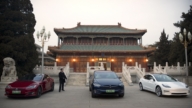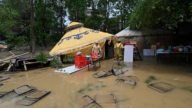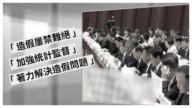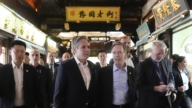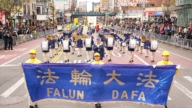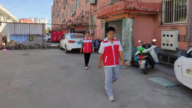【新唐人2013年03月27日訊】在北京舉行的「中國發展高層論壇2013」年會上,經濟專家吳敬璉指出,過去數十年來,保守的估計,大陸一些政府部門因為都市化運動,賺進了至少30萬億人民幣。他認為,如果土地產權問題不解決,各級政府會繼續使用舊有的辦法來支撐城鎮化,最後演變成「大拆大建的造城運動」。
大陸國務院「發展研究中心市場經濟研究所」經濟學家吳敬璉,3月23號在「中國發展高層論壇」上,嚴厲批評了中共的「造城運動」。
吳敬璉表示,過去數十年,大陸當局從農民手上取得土地、再將土地轉賣給地產開發商,從中賺取差價,最低估計有30萬億元人民幣。
《新唐人》特約經濟評論員馬傑森:「這個數字是很小很小一筆,因為中國現在房地產整體的價值,已經是巨大無比,遠遠超過美國的房地產的價值,在這樣的情況下,我覺得這是一個很保守的估計。」
而「新加坡國立大學東亞研究所」所長鄭永年在會議中指出,推進城鎮化的關鍵是土地制度。
鄭永年說,大陸現在的農村土地制度是集體所有制,「土地表面上看是農民的唐僧肉,誰都想吃,地產商、地方政府想吃,上級政府想吃,但是主人——農民吃不到。」
據報導,中國土地管理法規定,土地補償費和安置補助費的總和,不得超過土地被徵收前3年平均年產值的30倍。以一畝農地每年產出2000元人民幣計算,土地補償費和安置補助費最高也不過每畝6萬元。但隨著房地產市場的快速膨脹,一些土地的拍賣價格已經達到每畝數10萬元,甚至數百萬元人民幣,農民拿到的補償金還不到十分之一。
馬傑森:「徵收的政策,通常也是按當前土地使用的價值來徵收。比如說,北京郊區有一塊地是種玉米的,他就給你補償十年地產玉米的錢,然後徵用轉手,他就用高價拍賣的方式,到房地產市場拍賣,整個過程幾乎是空手套白狼的賺錢,這個事情不光是在北京,其實全中國各地遍佈這樣的事情。」
住在廣東的農民工曹偉淵表示,中共的「造城運動」是 農民工的權益。
大陸農民工曹偉淵:「本來農村的土地,根據現在國家法律制度歸集體所有,應該是有農民一份的,這是他的財產的權利,你憑甚麼要讓他放棄呢?然後放棄了,你在城市並沒有說國家免費給他房子住,安家甚麼,國家來承擔嗎﹖沒有﹗到城市,還是農民工自己掏錢去購房、安家等等。」
推行城鎮化,耕地面積勢必大幅度減少。未來人民吃甚麼?
曹偉淵認為,中共當局應該將農村土地制度私有化,讓農民自己處置本來屬於他們的土地財產,而不是現在看到的﹕農地被徵收,農民工只能往城市打工的命運。
曹偉淵:「我覺得它(中共)規定這個農村土地集體所有制,實際上還是為了最終控制農村的土地,那麼集體所有權掌握在這些村子裡的這些黨支部書記、村長手中。他們再通過這些黨支部書記、村長,可以隨便的對這個農村的土地進行一個控制。將來農民都到城裡了,然後剩下來的土地都歸他們隨便去處置了,這簡直是非常的不合理。」
馬傑森:「你整個土地沒有私有化這樣一個過程,土地是國家壟斷了。所有的土地價格是國家定,然後,城市的那個地區開發都是政府批准。這樣的過程基本上是政府主導一切的,所以說,你沒辦法真的實質上改革。」
日前,吳敬璉接受媒體採訪時表示,他作為一個研究工作者,研究事情發展的規律性,順應歷史潮流,能夠做多少做多少﹗但是他可以很清楚的認識到,中國未來的經濟,不改革的話,將是死路一條。
採訪/劉惠 編輯/黃億美 後製/郭敬
Chinese Communist Regime Takes Farmers’ Land by Force
During the “China Development Forum 2013″ in Beijing,
Wu Jinglian, a Mainland economist, commented.
Wu considers that due to the urbanization
movement in China, some local governments
have profited with at least 30 Trillion yuan.
If land property rights are not resolved, and local
governments continue to support it using old methods,
it will turn into a movement of
major demolitions and city buildings.
Wu Jinglian is an economist at the State Council Development
Research Center of the Market Economy Research Institute.
On March 23, during the China Development Forum on
March 23, he severely criticized the Chinese Communist
Party (CCP) for their city building movement.
Wu Jinglian said that authorities
have pocketed at least 30 trillion yuan.
This was through taking land from farmers,
and then selling it to real estate developers.
Jason Ma, NTD economic commentator:
“This figure is a very small sum.
This is because China’s real estate value is now
enormous, and far more than that of the United States.
So, I think that is a very conservative estimate.”
Zheng Yongnian, director of East Asian
Institute at Singapore National University:
“Rural land in China is collectively owned.
On the surface, farmers own rural land.
However, real estate developers, local governments, and
higher level governments desire it, so farmers can’t have it.”
It is said that according to land management laws,
the sum of land compensation and resettlement
fees shall not exceed 30 times the average annual
output value of the past 3 years.
With an acre of agricultural land with annual output
of 2,000 yuan, the highest land compensation
and resettlement fees will be 60,000 yuan.
However, with the rapid expansion of the
real estate market, some of the land
fetched 100,000 or even millions of yuan.
But farmers’ compensation is less than one-tenth of that.
Jason Ma: “Policies are usually based
on the value of the current land usage.
For example, Beijing suburbs grow a certain type of corn.
You can be compensated for the value of 10-years of corn.
Afterwards, your land will be sold
in a real estate market auction.
They will pocket the difference during the entire process.
This happens all over china, and not just in Beijing.
Cao Weiyuan, a migrant worker in Guangdong commented.
The CCP’s city building movement is a disguised
deprivation of rights and interests of migrant workers.
Cao Weiyuan: “Originally, rural land
was owned collectively by farmers.
According to the national legal system,
Those are their property rights.
How can you ask them to give it up?
The government promises them free housing and
resettlement fees. But it fails to uphold this.
Now migrant farmers have to find their own
housing, and pay for everything themselves.”
Implementation of urbanization will
substantially reduce arable land.
How are we going to feed future generations?
Cao Weiyuan thinks that the CCP
should privatize the rural land system.
It should let farmers decide what to do with their land.
With the current system, after agricultural
land is taken, farmers can only work in cities.
Caowei Yuan: “I think the collective ownership
of rural land is set up to control the land.
When the ultimate control of rural land is in the
hands of the village party branch secretary and
village heads, they can easily control rural land.
They can do whatever they wish after the
farmers move away. That is very unreasonable.”
Jason Ma: “So, without a land privatization
process, the state monopolizes land prices
and permits city development.
Basically, the government controls everything.
Therefore, there will not be any essential reform.”
Recently, during an media interview, Wu Jinglian said
that as a researcher, he can only study the regularity
of things as they develop, and follow history’s tide.
But, he can clearly see that without economic reform,
China’s economy is heading down a dead end street.


